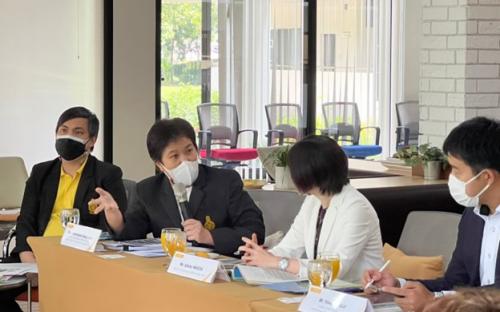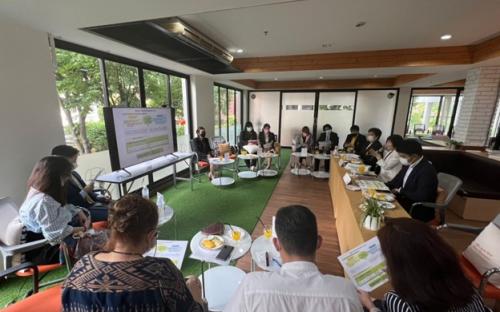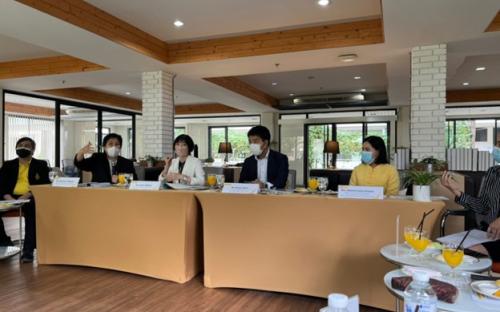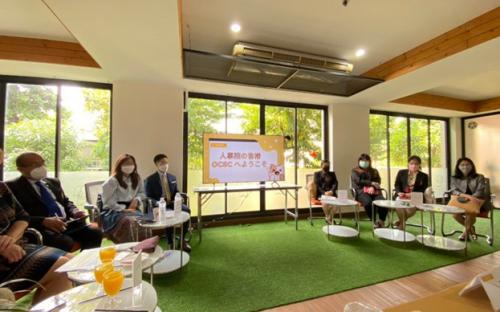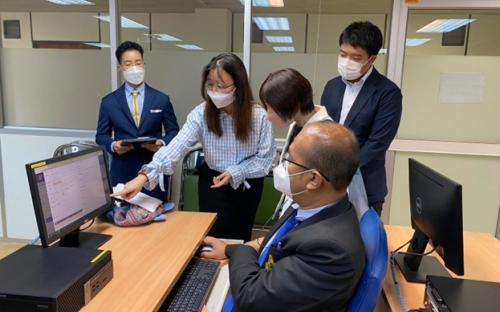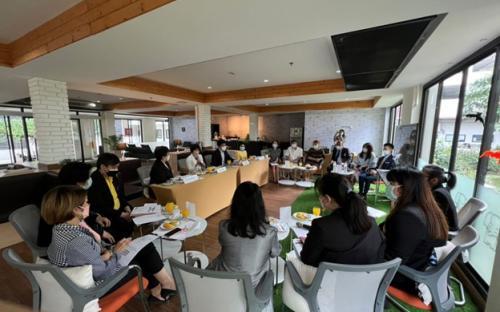Japan’s National Personnel Authority visits OCSC to discuss flexible working and digitalization in HR management
On 31 October 2022, Mrs. Kamonwan Sattayayut, OCSC’s Director of the Bureau of the Secretariat, together with the officials, welcomed Ms. Satoko Maeda, Director of the International Affairs Division, and Mr. Yosuke Tsuji, an international officer of the International Affairs Division from the National Personnel Authority (NPA), Japan on their visit to the OCSC to learn about the Thai civil service human resource management and share their perspectives.

The meeting was set in a relaxing atmosphere at OCSC’s co-working space, the OCSC Space. One of the topics discussed was flexible working arrangements. The representatives of the Research and Development Bureau at the OCSC explained that as flexible working has become the new normal worldwide, in Thailand, the Regulations of the Office of the Prime Minister on Remote Work Arrangements B.E. 2565 were introduced to allow civil servants and government employees to work at offsite locations if their operational efficiency is not compromised. Alternatively, there is a hybrid work model enabling people to blend working from home and working in the office. Those who commute to the office also benefit from the overlapping work hour system, which offers a variety of starting time and finishing time for them to choose from based on their own needs.
In Japan, working from home has become common as well. To facilitate this type of working arrangement, the Japanese government is planning to help reduce the burden of utility expenses for teleworkers. The working hour system will also be changed to bring about more flexibility. For example, employees may choose to work for any number of hours in a day as long as they reach the minimum required number of hours per week.
Such flexibility would not have been achieved without the digitalization of work processes. OCSC’s Information and Communication Technology Center has developed an electronic document transfer and management platform, enabling users to send, receive, store, and keep track of documents from anywhere and at any time. Online meeting applications are also widely used in intra- and inter-organizational communications.
In addition to these working tools, in today’s digital era, staff data is also managed in a digital way. The OCSC has adopted a Human Resource Information System (HRIS) platform to collect and store data on its personnel. A wide range of employee data is easily accessible in one system, which keeps track of changes to anything related to employees. With the system, the data can be analyzed to provide an overview of personnel expenses and compare these expenses against key performance indicators. It also reveals changes in the number of civil servants and other categories of public service personnel as well as information on newly established positions. Altogether, these insights help guide policy making in different aspects of human resource management from recruitment and selection (e.g. when to hire), learning and development (e.g. the number of training hours and that of participants) to disciplinary action (e.g. the number of cases, time to process cases).
Considering that everything is all about data today, related skills such as ICT skills are sought after by Japanese and Thai government agencies alike. With priority given to ICT skills, the Japanese government has established a digital category in the new entry level recruitment examination to recruit highly qualified talents with these much-needed skills. The recruitment of fixed-term staff with advanced ICT skills for both specialist and managerial positions is also facilitated with the mid-career recruitment system where the recruitment standard is clearly defined and the recruitment process is simplified for such talents. Higher compensation is also offered to attract them.
Likewise, in Thailand, lateral entry is a mechanism used to appoint experts with skills in high demand such as ICT. Interested individuals must have the qualifications specified in the job specifications of the advertised positions and meet the experience equivalence criteria. This is the amount of time that work experience equates to different position levels. Therefore, highly experienced individuals with any skills in demand can be placed in high positions without starting from the entry level.
To promote a digital culture in civil service, the Civil Service Training Institute at the OCSC is working to provide integrated human resource development programs which focus on seven digital skillsets for all position levels. These include digital literacy, digital governance, compliance and standardization, digital technology, digital service and process design, strategic project management, digital leadership and digital transformation. The 70:20:10 (self-learning, learning from others, in-class learning) and the 60:40 (learning by doing, lecture) development frameworks are employed. The ultimate goal is to develop an open, connected and smart government for citizens.
Following the fruitful discussions at the OCSC Space, OCSC’s officials gave a tour of the premises, starting from the Departmental Personnel Information System (DPIS) training center. The tour continued to the statue of King Rama VII, who laid a strong foundation for Thailand’s civil service system and the OCSC’s guardian Buddha statue. Both sides exchanged gifts and participated in a photo session, looking forward to any future cooperation.

